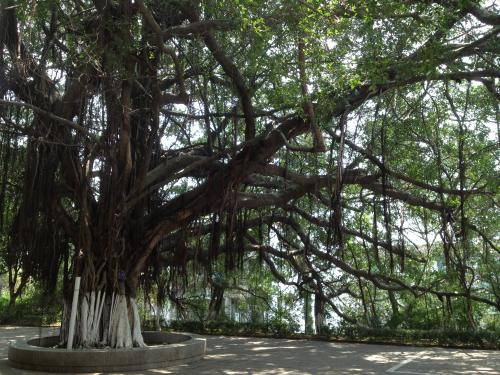(单词翻译:单击)
听力文本
This is Scientific American — 60-Second Science. I'm Steve Mirsky.
"Well, lots of people recognize that as humans get older they tend to have less and less children...trees do it the other way around."
David Lindenmayer. He studies conservation, landscape ecology and biodiversity at the Australian National University College of Science in Canberra. On January 26th he spoke to Scientific American Editor in Chief Mariette DiChristina when they were both at the World Economic Forum in Davos.
DL: "What happens is that the older some of these really big old trees get, the more seeds they produce and the more germinants they're likely to have. So it's actually the polar opposite of what we see with humans and most other animals, so really quite extraordinary."

Mariette DiChristina: "And how about the number of older trees that we have today, how does that look?"
DL: "It's quite a distressing situation, because in many, many forests and woodland and other ecosystems around the world, populations of large old trees are declining very, very quickly. And this matters because a lot of biodiversity, a lot of carbon, a lot of key ecosystem processes are associated with those really big, old trees."
MD: "Is there something we can do about this?"
DL: "Absolutely there is. We can make sure we grow more forest, we can make sure we protect the big trees that we have now, and we can make sure that we don't do things that really put a lot of pressure on those trees. Straight out, just cutting them down—we should not be cutting down really big, old trees anymore."
Thanks for the minute for Scientific American — 60-Second Science. I'm Steve Mirsky.
参考译文
这里是科学美国人——60秒科学。我是史蒂夫·米尔斯基。
有一分钟时间吗?
“好吧,很多人认识到,随着人类年龄的增长,他们的孩子越来越少,树木的情况却正相反。”
大卫·林登麦伊尔说到。他在堪培拉的澳大利亚国立大学科学学院研究保护、景观生态和生物多样性。1月26日,他与《科学美国人》主编玛丽埃特·迪克里斯蒂娜一同出席达沃斯世界经济论坛时进行了交流。
大卫·林登麦伊尔:“现在的情况是,一些巨型古树越老,其所产生的种子数量越多,发芽的数量也可能更多。这实际上与我们在人类和大多数其他动物身上看到的情况正相反,因此这真的极不同寻常。”
玛丽埃特·迪克里斯蒂娜:“目前现存多少棵古树?它们的情况怎么样?”
大卫·林登麦伊尔:“现在的情况令人相当痛心,因为在世界上许多森林、林地和其他生态系统中,大型古树的种群数量正在极速下降。这个问题不可忽视,因为许多生物多样性、碳和关键的生态系统过程都与大型古树有关。”
玛丽埃特·迪克里斯蒂娜:“我们能为此做些什么吗?”
大卫·林登麦伊尔:“绝对有我们可以做的事情。我们可以确保种植更多树木、保护现存大树,不做会对这些树木有压力的事情。坦白说,就是不再砍树,我们不应该再砍伐这些大型古树了。”
谢谢大家收听科学美国人——60秒科学。我是史蒂夫·米尔斯基。
译文为可可英语翻译,未经授权请勿转载!
重点讲解
重点讲解:
1. the other way around 相反地;倒过来;
Happiness can lead to success, rather than just the other way around.
快乐可导致成功,而不是反过来。
2. be likely to do sth. 可能(做…)的;有(…)倾向的;
Some jobs are quite likely to have a negative spillover into family life.
有些工作很可能会对家庭生活产生不良影响。
3. straight out 坦白地,率直地;
I told her straight out that there was no possibility of a pay increase.
我坦率地告诉她没有加薪的可能。
3. cut down 砍倒(树木);
They cut down some trees to knock down the fire and prevent it from spreading further.
他们砍倒了一些树以控制火势,使火不再蔓延开去。


